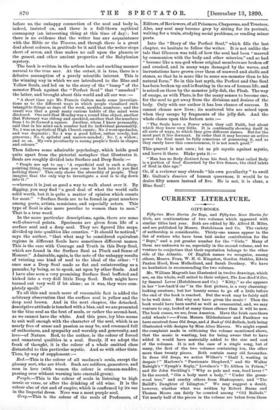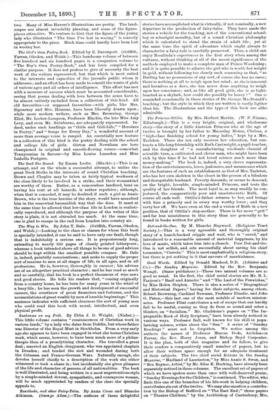Mr. William Magrath has illustrated in twelve drawings, which are,
on the whole, well suited to their subject, The Low-Back'd Car, by Samuel Lover (Hutchinson and Co.) "Kitty," as she appears in her " low-back'd car" in the first picture, is a very charming- looking creature; but her beauty seems to go off a little before the end of the book is reached. But the work may be fairly said to be well done. But why not have given the music ? Then the book would have been useful as well as ornamental, and, we may venture to say, looked at many times oftener than it will be now. The book comes, we see, from America. Have the Irish cars there solid wheels P—From Messrs. Hildesheimer and Faulkner we have received Some Old Songs, and A Book of Old Ballade, both being illustrated with designs by Miss Alice Havers. We might repeat the complaint made in criticising the volume mentioned above, that the music is wanting, but for being aware that to have added it would have materially added to the size and cost of the volumes. It is not the case of a single song, but of many, the first of the two volumes containing ten, the other more than twenty pieces. Both contain many old favourites. In Some Old Songs, we notice Wither's "Shall I, wasting in despair ?" Marlowe's "Passionate Shepherd," and Sir Walter Raleigh's " Nymph's Reply," Lovelace's " To Althea in Prison," and Sir John Suckling's "Why so pale and wan, fond lover ?" In the second, "Gin a body meet a body," "Under the green- wood tree," and sundry others from Shakespeare, and "The Bailiff's Daughter of Islington." We may suggest a doubt, however, whether what was written by Robert Burns and Thomas Moore can fairly be counted among "Old Ballads." Yet nearly half of the pieces in the volume are taken from these
two. Many of Miss Havers's illustrations are pretty. The land- scapes are almost invariably pleasing, and some of the figure- pieces attractive. We venture to hint that the figure of the young lady who illustrates "The time I've lost in wooing" is scarcely appropriate to the piece. Much time could hardly have been lost in wooing her.











































 Previous page
Previous page